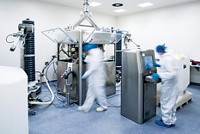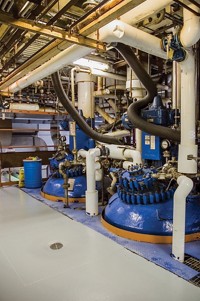Advertisement
Grab your lab coat. Let's get started
Welcome!
Welcome!
Create an account below to get 6 C&EN articles per month, receive newsletters and more - all free.
It seems this is your first time logging in online. Please enter the following information to continue.
As an ACS member you automatically get access to this site. All we need is few more details to create your reading experience.
Not you? Sign in with a different account.
Not you? Sign in with a different account.
ERROR 1
ERROR 1
ERROR 2
ERROR 2
ERROR 2
ERROR 2
ERROR 2
Password and Confirm password must match.
If you have an ACS member number, please enter it here so we can link this account to your membership. (optional)
ERROR 2
ACS values your privacy. By submitting your information, you are gaining access to C&EN and subscribing to our weekly newsletter. We use the information you provide to make your reading experience better, and we will never sell your data to third party members.
Outsourcing
Siegfried moves downstream as Alcami exits chemistry services
Two pharmaceutical service acquisitions reflect European dominance, emphasis on finished drugs
by Rick Mullin
October 7, 2020
| A version of this story appeared in
Volume 98, Issue 39

Recent pharmaceutical service acquisitions highlight three trends in the sector: the acquisition of drug company plants by service firms, the growing presence of European companies in the US, and an increased emphasis on finished-drug manufacturing.
The Swiss services firm Siegfried has agreed to buy two Novartis manufacturing sites near Barcelona, Spain—an ophthalmic sterile drug plant in El Masnou and a solid-dose form site in Barberà del Vallès. The agreement includes multiyear supply contracts with Novartis. Siegfried got its start as an active pharmaceutical ingredient (API) maker but has now made three purchases of finished-drug facilities.
Meanwhile, the British services firm Sterling Pharma will buy an API plant in Germantown, Wisconsin, from Alcami. The deal marks Sterling’s second US purchase following its buy of a CiVentiChem plant in Cary, North Carolina, last year.
Alcami, which formed in 2013 through the combination of an API maker and a finished-drug contractor, will exit APIs with the deal, having sold its API facility in the Netherlands to MercachemSyncom earlier this year. Alcami recently expanded its finished-drug manufacturing site in South Carolina and acquired TriPharm Services, a finished-drug firm in North Carolina, earlier this year.
Bernhard J. Paul, principal consultant at Carinth Consulting, calls Siegfried’s purchase of drug company facilities the most recent example of a strategy that has proven successful for both service firms and drug makers. CordenPharma’s 2017 acquisition of a Pfizer plant in Boulder, Colorado, is another example.
“This looks like a win for both sides,” Paul says. “Novartis gets to offload a plant they probably don’t run at full capacity, and Siegfried gets a plant with capacity and some special technology as well as a contract to supply products to Novartis, which is a tremendous help because it’s difficult to buy empty plants.”
Paul also sees the Sterling-Alcami deal as a win-win. “Alcami said last year that they want to go into more of a high-growth area,” he says, referencing the sale to Mercachem. “Sterling is trying to break into the US market, and this is a much larger manufacturing facility” than the plant in Cary.




Join the conversation
Contact the reporter
Submit a Letter to the Editor for publication
Engage with us on Twitter